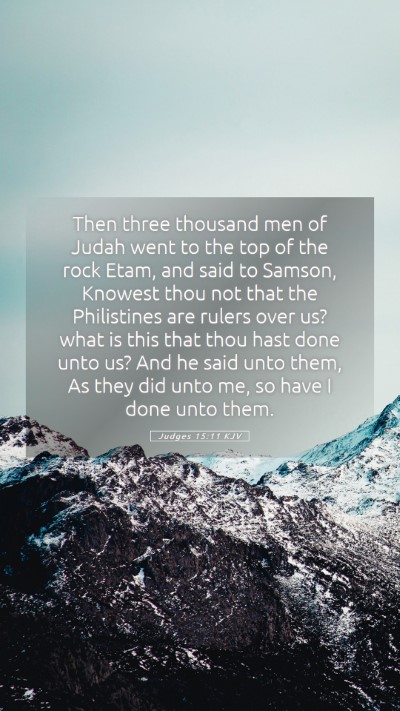Old Testament
Genesis Exodus Leviticus Numbers Deuteronomy Joshua Judges Ruth 1 Samuel 2 Samuel 1 Kings 2 Kings 1 Chronicles 2 Chronicles Ezra Nehemiah Esther Job Psalms Proverbs Ecclesiastes Song of Solomon Isaiah Jeremiah Lamentations Ezekiel Daniel Hosea Joel Amos Obadiah Jonah Micah Nahum Habakkuk Zephaniah Haggai Zechariah MalachiJudges 15:11 Meaning
What is the meaning of Judges 15:11?
Then three thousand men of Judah went to the top of the rock Etam, and said to Samson, Knowest thou not that the Philistines are rulers over us? what is this that thou hast done unto us? And he said unto them, As they did unto me, so have I done unto them.
Judges 15:11 Bible Verse Meaning
Understanding Judges 15:11
Judges 15:11 states: "Then three thousand men of Judah went to the cleft of the rock Etam, and said to Samson, 'Do you not know that the Philistines rule over us? What is this you have done to us?' And he said to them, 'As they did to me, so have I done to them.'"
This verse represents a complex moment in Samson’s narrative, highlighting his conflict with the Philistines and the response of the people of Judah. The commentary from public domain sources sheds light on this intricate historical and cultural context.
Bible Verse Meanings and Interpretations
Historical Background
The scene unfolds during a time when the Israelites were under the oppression of the Philistines. Historical context reveals that those living in the land were often caught between their allegiance to God and the pressure from surrounding nations. Matthew Henry notes that this oppression reflects the consequences of Israel's disobedience to God.
Context of the Passage
Judges 15:11 occurs after Samson has taken drastic action against the Philistines. Albert Barnes highlights that the Philistines' rule over Israel was tyrannical, leading to a desire among the Israelites to appease their oppressors rather than fight against them. The men of Judah’s inquiry implies a sense of fear and a lack of understanding of Samson's calling and purpose.
Interpretation of Key Phrases
-
"Three thousand men of Judah":
This indicates their collective concern and submission to the Philistines, as they are more interested in self-preservation than in supporting Samson's efforts against their oppressors.
-
"Do you not know that the Philistines rule over us?":
This rhetorical question reflects their subservience and fear. Adam Clarke explains that it represents the people's unwillingness to confront their enemies, revealing a sense of resignation.
-
"What is this you have done to us?":
They express confusion and anger towards Samson's actions, indicating a lack of faith in God's strategy for liberation. Here, the relationship between Samson and the people of Judah is stressed—their misunderstanding of his purpose creates tension.
Significance of Samson’s Response
Samson’s reply, "As they did to me, so have I done to them," communicates his justification for retaliation. Henry comments on the notion of personal retribution prevalent in that era, reflecting the eye-for-an-eye sentiment. Samson believes that he is merely returning the favor, showcasing his impulsive nature rather than a calculated approach to deliverance.
Lessons and Application
The verse prompts readers to consider the implications of their actions and responses to conflicts. The struggle between faith and fear is evident, suggesting that reliance on God can sometimes be overshadowed by immediate concerns for safety and survival.
This passage also serves as a reminder of the importance of unity in a community facing oppression. While Samson took action, the lack of support from his own people illustrates the challenges faced by those called to lead or stand against injustice.
Related Bible Cross References
- Judges 13:5 - The prophecy of Samson's birth and his purpose as a Nazirite.
- Judges 14:1-3 - Samson's desire for a Philistine woman and the tensions it caused.
- Judges 16:23-30 - Samson's eventual confrontation with the Philistines at the temple of Dagon.
- 1 Samuel 13:19-23 - The oppression of the Philistines during Saul's reign, mirroring the scenarios of conflict.
Conclusion
Judges 15:11 serves as a pivotal moment in Samson's story, encapsulating themes of conflict, misunderstanding, and the struggle for freedom. The insights from commentaries enhance our understanding of this verse, emphasizing the need for a deeper relationship with God amidst trials and the importance of collective courage in facing challenges.


